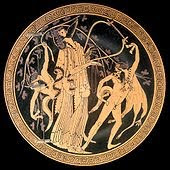

Other stories from the Trojan War
When the Achaean ships reached the beach of Troy, no one would jump ashore, since there was an oracle that the first Achaean to jump on Trojan soil would die. Odysseus tossed his shield on the shore and jumped on his shield. He was followed by Protesilaus, who jumped on Trojan soil and later became the first to die. Odysseus never forgave Palamedes for unmasking his feigned madness, leading him to frame him as a traitor.
At one point, Odysseus convinced a Trojan captive to write a letter pretending to be from Palamedes. A sum of gold was mentioned to have been sent as a reward for Palamedes's treachery. Odysseus then killed the prisoner and hid the gold in Palamedes's tent. He ensured that the letter was found and acquired by Agamemnon, and also gave hints directing the Argives to the gold.
 This was evidence enough for the Greeks and they had Palamedes stoned to death. Other sources say that Odysseus and Diomedes goaded Palamedes into descending a wall with the prospect of treasure being at the bottom. When Palamedes reached the bottom, the two proceeded to bury him with stones, killing him.
This was evidence enough for the Greeks and they had Palamedes stoned to death. Other sources say that Odysseus and Diomedes goaded Palamedes into descending a wall with the prospect of treasure being at the bottom. When Palamedes reached the bottom, the two proceeded to bury him with stones, killing him.When Achilles was slain in battle, it was Odysseus and Telamonian Ajax who successfully retrieved the fallen warrior's body and armour in the thick of heavy fighting. During the funeral games for Achilles, Odysseus competed once again with Telamonian Ajax. Thetis said that the arms of Achilles would go to the bravest of the Greeks, but only these two warriors dared lay claim to that title. The two Argives became embroiled in a heavy dispute about one another's merits to receive the reward.
The Greeks dithered out of fear in deciding a winner, because they did not want to insult one and have him abandon the war effort. Nestor suggested that they allow the captive Trojans decide the winner. Some accounts disagree, suggesting that the Greeks themselves held a secret vote. In any case, Odysseus was the winner. Enraged and humiliated, Ajax was driven mad by Athena. When he returned to his senses, in shame at how he had slaughtered livestock in his madness, Ajax killed himself by the sword that Hector had given him. Together with Diomedes, Odysseus went to fetch Achilles' son, Pyrrhus, to come to the aid of the Achaeans, because an oracle had stated that Troy could not be taken without him.
A great warrior, Pyrrhus was also called Neoptolemus (Greek: "new warrior"). Upon the success of the mission, Odysseus gave Achilles' armor to him. It was later learned that the war could not be won without the poisonous arrows of Heracles, which were owned by the abandoned Philoctetes.

Odysseus and Diomedes (or, according to some accounts, Odysseus and Neoptolemus) went out to retrieve them. Upon their arrival, Philoctetes (still suffering from the wound) was seen still to be enraged at the Danaans, especially Odysseus, for abandoning him. Although his first instinct was to shoot Odysseus, his anger was eventually diffused by Odysseus's persuasive powers and the influence of the gods. Odysseus returned to the Argive camp with Philoctetes and his arrows. Odysseus and Diomedes would later steal the Palladium that lay within Troy's walls, for the Greeks were told they could not sack the city without it. Some sources indicate that Odysseus schemed to kill his partner on the way back, but Diomedes thwarted this attempt. Perhaps Odysseus' most famous contribution to the Greek war effort was devising the strategem of the Trojan Horse, which allowed the Greek army to sneak into Troy under cover of darkness. It was built by Epeius and filled with Greek warriors, led by Odysseus.
After Troy was sacked, Odysseus threw Hector's son Astyanax from the city walls to his death, lest the child reach manhood and avenge his father.




Nema komentara:
Objavi komentar